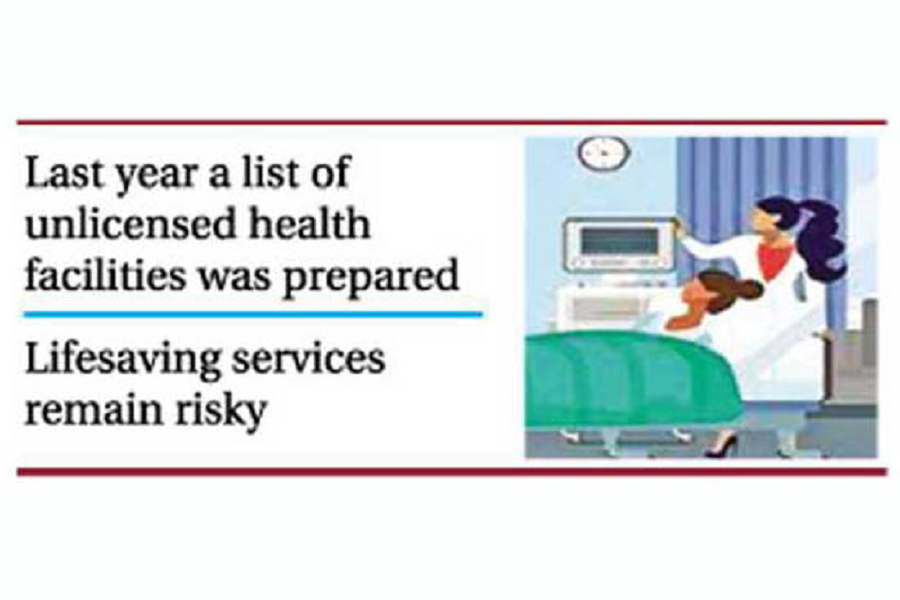Government's clearout drive against unlicensed private hospitals, clinics and diagnostic centres across Bangladesh looks almost lull halfway through, leaving healthcare services risky.
On allegations from various quarters against such non-compliant hospices, the state-backed health directorate on May 26 asked all illegal healthcare facilities to wind up within 72 hours.
Later, the Directorate General of Health Services (DGHS) cracked down on such health centres with a promissory statement to continue the drive round the year to ensure compliance in the lifesaving services.
But it is alleged that the post-crackdown monitoring has abated within weeks into the special drive.
But DGHS officials bin this allegation, saying they are regularly conducting drive against errant entrepreneurs and non-compliant infirmaries.
DGHS director (hospital and clinic) Dr Md Belal Hossain says local healthcare authorities, divisional commissioners and district-level civil surgeons take action routinely.
More than 2,000 unregistered hospitals, clinics and diagnostic centres were shut during the crackdown. However, many others applied for new licence or renewal, he tells the FE.
"We won't allow any non-compliant facilities in the healthcare service," he said, adding that the number of registered private hospitals and clinics rose to 10,800 because of the action.
Before the crackdown, the number of compliant privately-owned care centres was just over 10,000.
Seeking anonymity, a DGHS official says the drive remains almost halted because of manpower shortages, among other reasons.
"Civil surgeons and other officials concerned are busy doing other jobs. It's very tough for them to continue the drive all year round. We need more manpower…"
According to the official, similar drives were conducted in November 2018 and in August 2020 but with little or no expected outcomes.
He cites four key reasons -- staff shortage, carelessness of local health authorities, weak security of health administrators and abuse of power--behind this failure.
Last year, divisional directors compiled a list of unlicensed health facilities, with 3,535 in Dhaka division, 2,232 in Chattogram, 1,523 in Khulna, 1,438 in Rajshahi, 1,099 in Rangpur, 963 in Mymensingh, 603 in Barishal and 546 in Sylhet.
Medical scholars believe periodic crackdown with announcement will bring no expected outcome as the unruly entrepreneurs, who treat healthcare as a "commodity" will come back at opportune time.
They suggest that the government focus more on regular monitoring through manning the directorate.
However, Bangladesh Medical Association secretary-general Dr Md Ehteshamul Huq Choudhury appreciates the move, saying it should have been taken much earlier.
"The DGHS lacks enough manpower to continue such activity round the year to ensure compliance by both public and private facilities," he tells the FE.
About the Medical Practice and Private Clinics and Laboratories (Regulation) Ordinance, Dr Choudhury says, it needs to be rationalised.
"The ordinance stipulates that one doctor and three diploma nurses are needed for a 10-bed hospital, but where do we get too many diploma nurses for too many hospitals?"
On the other hand, each diagnostic unit must have a full-time radiologist and a pathologist, but the reality is public hospitals have failed to recruit them.
"So, we need to update it. We can allow part-time professionals for a certain period unless we produce enough professionals," observes the BMA secretary.
Dhaka Community Hospital Trust chairman Prof Quazi Quamruzzaman says the entire system needs to be decentralised through empowering divisional and district units for regular monitoring.
There are many people who treat healthcare as a commodity and the regulator in most cases cannot monitor mainly for lack of adequate manpower, he adds.
"This causes the problem," mentions Prof Quamruzzaman.
But it cannot be redressed by only periodic drives. Regular inspection is imperative for this, he asserts.


